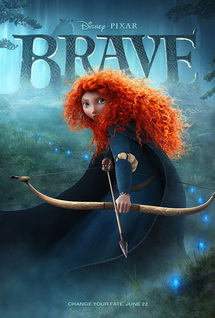 Note: This review originally appeared on Scene-Stealers. For a far more profanity laden version, check out this week’s Four Color Freak-Out.
Note: This review originally appeared on Scene-Stealers. For a far more profanity laden version, check out this week’s Four Color Freak-Out.
Pixar is a name that’s earned a definition in our minds as being synonymous with flawless execution, breath-taking visuals, and above all an adherence to the how-is-this-not-obvious ethos of “It’s the story, stupid”. And while it’s taken them a whopping 17 years to release a feature film with a female lead, with Friday’s release of “Brave” the studio has accomplished something venerable old Disney hasn’t pulled off in 75 years of filmmaking: A charming, independent princess who is not only the true hero of the story, (one with two live and loving parents no less) but one at play in an oddly mature story resting wholly upon the oft-complicated dynamic of the mother-daughter relationship. Considering the bank ye old House o’ Mouse hauls in on the backs of the Disney Princess line, this is brave new territory indeed.
Brave was a groundbreaker before it even began production: It’s the first film from the studio with a credited female director (Brenda Chapman, who was replaced by Mark Anderson halfway through the production) and it’s the first Pixar film with 3 directors: the aforementioned Chapman and Anderson, along with Steve Purcell, a man better as the creator of Sam & Max, the stars of an too infrequent comic strip in the LucasArts newsletter, to say nothing of the protagonists of one of the best adventure puzzle games ever made. It’s also the first Pixar film to firmly plant its flag in what would otherwise be considered Disney territory: the fairy tale legend with an honest-to-goodness princess.
As the trailer and marketing campaign has done a splendid job in masking some of the central plot points of the film I shan’t ruin them here, but here’s the quick primer: Princess Merida (Kelly McDonald, whom most of us haven’t thought of since her scene-stealing debut in Trainspotting) is the rambunctious and free-spirited daughter of Elinor (Emma Thompson) and Fergus (Billy Connolly), rulers of the Scottish kingdom of DunBroch. Much like her mostly mute trio of brothers, Merida takes far more after her boisterous father, to the eternal consternation of her prim and proper mother, who spends her time with the Sisyphean task of turning the horse-riding, archery obsessed firebrand into the model princess her station demands. Already chafing from the bonds of state and protocol, Merida is told her hand in marriage is to be offered to the first borne sons of the clan chieftains in a rite designed to keep the kingdom whole, prompting her to seek otherworldly means by which to change what she sees as the fate her mother has planned for her.
See what I mean? Removed of the details and execution the plot reads like any number of Disney romps, but where Disney goes for fantasy wish fulfillment (and gender roles that haven’t been shocking since 1572), Chapman, Anderson, and Purcell take the time to explore the often resentful minefield of a mother and daughter’s life together, giving us a nuanced look at a relationship we men may sometimes suffer the collateral damage from, but rarely understand in full. Indeed the whole film is from the perspective of this woman and still-somewhat-a-child: A land filled with (and ruled by) loud, buffoonish men who get to have all the fun while Merida and Elinor spar over duty versus desire, unable to communicate clearly outside the heat of an argument.
I’ll be honest: I’m not entirely certain I would appreciate this film the way I do were I not a husband and father: My proximity to the dynamic has made me hyper aware of its subtlety, and my immersion in what passes for “girl pop culture” has shown me how lacking the space is for role models not built upon an ideal dreamed up by a decidedly masculine sensibility. But that’s not to say that this film doesn’t hold resonance no matter your chromosomal makeup. We’ve all felt the chafing of parental expectations, we’ve all said and done in anger those things we dearly wish we could undo, and (hopefully) we’ve all found those moments wherein we see our parents’ perspective and set aside our myopic view of the world. Also: Bears.
And while the message and emotional payoff is certainly top-notch, I still find myself holding back from putting this up in the realm of Pixar’s best. As with all of the studio’s work it’s just gorgeous to look at (and the physics of Merida’s unruly mop of red hair alone stands as a technological wonder), but the 3D showing I saw was muddy and at times blurry (though that may easily be the fault of the projector/projectionist), and ultimately it’s hard to ignore how by-rote Disneyesque the film plays out plotwise no matter how well it’s subverting the tropes. In the end I put it in the same camp as Ratatouille and Up: An delightful and rewarding film that still has to be measured against Toy Story 3, Wall-E, etc. etc.. And in that constellation this star shines bright, but not quite bright enough to burn supernova like the same.
I dearly hope this is a film that lives on as a well-loved classic in the hearts of not only my daughters, but the generation at hand who will find themselves viewing the sure-to-be-seen-as-parochial mindset of their parents with internet-powered disdain all too soon, but most of all by those looking for a Disney princess we can finally be proud of.







{ 1 comment }
I just got out of it and as of right now I have my issues with the movie but as far as Pixar doing a better princess story than Disney has ever done: they succeeded.
Comments on this entry are closed.